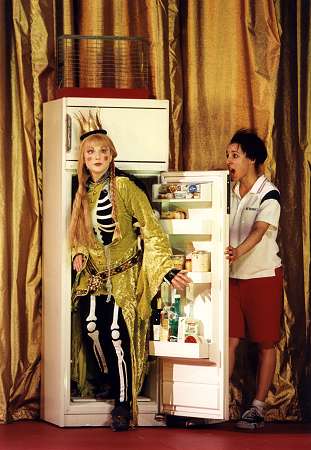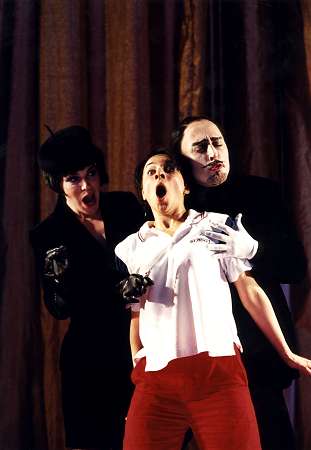|
<< -- 2 -- Wilfrid Mellers SECOND SIGHT

Ravel's first opera, L'Heure Espagnole (1911), had involved toys
and mechanical clocks as contrivances that, invented by man, boosted his
ego in making him feel a shade god-like. In L'Enfant et les Sortilèges,
however, the opposite occurs: birds, beasts, insects, trees, even inanimate
objects like chairs, teach humanity to the fallen child, who becomes man
regenerate. The experience of a Fall reanimates human awareness: which is
why the human voice is here the heart of the matter. Although a modest piece,
L'Enfant is essentially a singers' opera; even the central Child
-- in this performance played by Claire Wild, who looks tiny enough and acts
and sings zestfully enough to be a little boy -- is given tricky roulades
to negotiate, which she does as fluently as Christine Buffle sails through
the crazy coloratura of the Fire and of the Nightingale.

Similarly, the serene modality of the Fairy Princess, the creakily arthritic
arioso of the arm-chair or of the assaulted tree, and especially the love-song
of the cats (a parody of Ravel's own La Valse of 1919, from which
hysteria is purged, leaving only tenderness) -- all call on highly-developed
vocal techniques to embrace a remarkable range of emotions from the comic
and grotesque, to the suave and sentimental, to the pathetic and profound.
Emmanuel Plasson, as conductor, effects these subtle transitions with a
French nonchalance that never denies expressivity; and which, in the choral
epilogue, attains authentic transcendence, even sublimity. Birds, beasts,
insects, trees sing a modal hymn of gratitude because the pity they have
felt finds an echo in the heart of the fallen child: who sings in consort
with them, until his song is stifled with a sob ('Maman!') as he awakens,
on the threshold of the house of man.

If Ravel sometimes seemed cold and aloof as a man it must have been,
not because he felt too little, but because he felt too much. He feared,
not without reason, that the unimaginative harshness of the adult world
would kill love; paradoxically, it was his apparently sophisticated irony
that shielded the innocence of a child, for the salvation of which,
in a more than usually corrupt world, the artist lived.
Continue >>
Copyright © 9 June 2002
Wilfrid Mellers, York, UK

|

